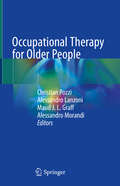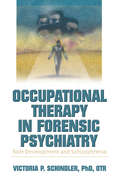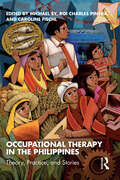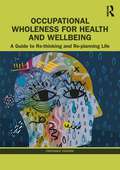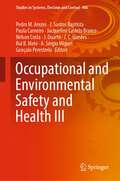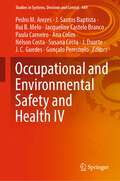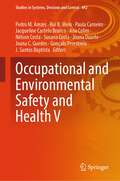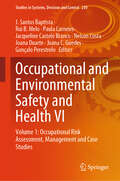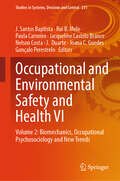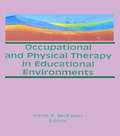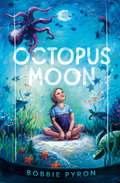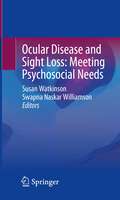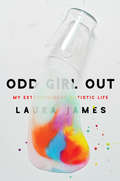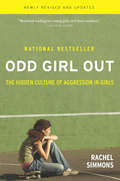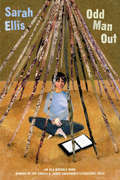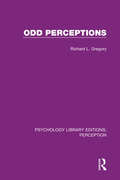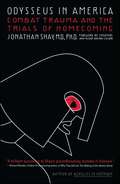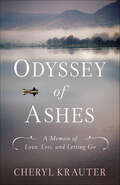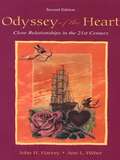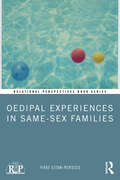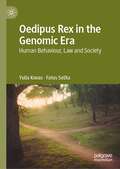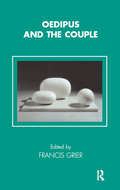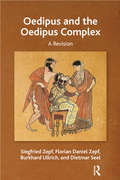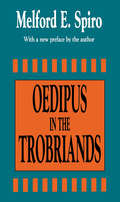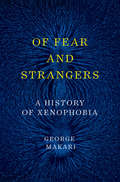- Table View
- List View
Occupational Therapy for Older People
by Christian Pozzi Alessandro Lanzoni Maud J. L. Graff Alessandro MorandiThis book focuses on evidence-based occupational therapy in the care of older adults in different clinical settings, from home to acute hospital, from intensive care unit to rehabilitation centers and nursing homes. Occupational therapy has progressively developed as a new discipline aiming to improve the daily life of individuals of different ages, from children to older adults. The book first reviews the interaction between occupational therapy and geriatrics and then discusses in depth how occupational therapy interventions are applied in the community, in the acute hospital and in the nursing home. It highlights the key role of occupational therapy in the management of frail patients, including critically ill older patients and persons with dementia, and describes in detail how to maintain occupational therapy interventions across different settings to avoid the fragmentation of care. The ageing population requires new innovative approaches to improve the quality of life, and as such this book provides clinicians with handy, key information on how to implement occupational therapy in the daily clinical care of older adults based on the current scientific evidence.
Occupational Therapy in Forensic Psychiatry: Role Development and Schizophrenia
by Victoria P SchindlerLearn Role Development techniques to provide more effective therapy to schizophrenic clients!Occupational Therapy in Forensic Psychiatry: Role Development and Schizophrenia presents a set of guidelines for clinical practice in Role Development. Role Development is a treatment intervention designed to assist individuals diagnosed with schizophrenia in developing social roles, task skills, and interpersonal skills. The book provides concrete, practical suggestions for using Role Develpoment with clients. These guidelines are thoroughly described as are methods for implementing treatment. With the resources provided in Occupational Therapy in Forensic Psychiatry, OT clinicians will have the tools and information to understand Role Development, to conduct evaluations, and to plan and implement treatment using the set of guidelines. The book describes a reseach study from a maximum-security psychiatric facility. Participants in the study had an extensive psychiatric history as well as criminal charges. Most no longer had active social roles but viewed their roles as patient or inmate. The intervention, Role Development, was successful in assisting them to develop roles such as worker, student, friend, and group member. Despite their very difficult life circumstances and serious mental illness, the participants responded very positively and demonstrated a willingness and ability to develop social roles, and the skills that are the foundation to the roles. Tables and figures highlight the results of the study. In Occupational Therapy in Forensic Psychiatry, you&’ll find: a set of guidelines for practicing Role Development a research study documenting the effectiveness of Role Development tables and figures highlighting the results of the research study practical tools, resources, and methods to implement Role Development case studies demonstrating the application of Role Development and much more!Occupational Therapy in Forensic Psychiatry is a comprehensive resource for OT clinicians and students. It provides the direction needed for health care practitioners to learn Role Development techniques. Clinicians who work with clients diagnosed with schizophrenia or other forms of severe and persistent mental illness can use the information in this book to provide effective treatment to their clients.
Occupational Therapy in the Philippines: Theory, Practice, and Stories
by Michael SyThe first book of its kind, Occupational Therapy in the Philippines provides a context to the existing occupational therapy knowledge base from a Filipino perspective. This book acts as a guide for occupational therapists to develop and continually evaluate trusting working relationships with clients and other health and social care professionals, leading to more effective occupational therapy services. It discusses occupational therapy concepts, principles, and practices and illustrates examples of occupational therapy practices based on Filipino case studies, narratives, and evidence, and offers recommendations on how to enrich occupational therapy understanding globally. The chapters delve into theory, education and training, clinical practice, research, case studies and topical issues. This book is an ideal read for occupational therapy students and practitioners from all areas of practice as well as to those who are interested to know more about occupational therapy.
Occupational Wholeness for Health and Wellbeing: A Guide to Re-thinking and Re-planning Life
by Farzaneh YazdaniThis practical book introduces a new, research-based model of occupational wholeness, a way of conceptualising satisfaction with what one does to meet needs for being, belonging and becoming. It explores how to: conceptualise people's life stories through the model; take vital steps to help identify any problems; draw personal profiles; introduce intervention strategies for promoting wellbeing. Focusing on enhancing wellbeing, rather than ill health, the concept of occupational wholeness supports people to feel more control of their own lives and helps to identify what balance can be created, while recognising personal limitations and environmental restrictions. Alongside theoretical background, it includes practice applications and practical tools, with scenarios and activities to consolidate learning. Providing a unique combination of the practice and theory of occupational science, Yazdani integrates occupational science, psychology and sociology with clinical experience of working with diverse groups of people in different countries. This book is an important guide and reference for occupational therapists, occupational scientists, counsellors and life coaches.
Occupational and Environmental Safety and Health III (Studies in Systems, Decision and Control #406)
by Pedro M. Arezes Paula Carneiro Rui B. Melo Gonçalo Perestrelo Nélson Costa A. Sérgio Miguel J. Duarte J. Santos Baptista Jacqueline Castelo Branco J. C. GuedesThis book gathers cutting-edge research and best practices relating to occupational risk and safety management, healthcare and ergonomics. It covers strategies for different types of industry, such as construction, food, chemical and healthcare. It gives a special emphasis on challenges posed by automation, discussing solutions offered by technologies, and reporting on case studies carried out in different countries. Chapters are based on selected contributions to the 17th International Symposium on Occupational Safety and Hygiene (SHO 2021), held virtually on November 17–19, 2021, from Portugal. By reporting on different perspectives, such as the ones from managers, workers and OSH professionals, and covering timely issues, such as safety evaluation of human-robot collaboration, this book offers extensive information and a source of inspiration to OSH researchers, practitioners and organizations operating in both local and global contexts.
Occupational and Environmental Safety and Health IV (Studies in Systems, Decision and Control #449)
by Pedro M. Arezes Paula Carneiro Rui B. Melo Gonçalo Perestrelo Nélson Costa J. Duarte J. Santos Baptista Jacqueline Castelo Branco J. C. Guedes Ana Colim Susana CostaThis book gathers cutting-edge research and best practices relating to occupational risk and safety management, healthcare and ergonomics. It covers strategies for different industries, such as construction, chemical and healthcare. It emphasises challenges posed by automation, discusses solutions offered by technologies, and reports on case studies carried out in different countries. Chapters are based on selected contributions to the 18th International Symposium on Occupational Safety and Hygiene (SHO 2022), held on September 8–9, 2022, in Porto, Portugal. By reporting on different perspectives, such as the ones from managers, workers and OSH professionals, and covering timely issues, such as implications of telework ,issues related to gender inequality and applications of machine learning techniques in occupational health, this book offers extensive information and a source of inspiration to OSH researchers, practitioners and organizations operating in both local and global contexts.
Occupational and Environmental Safety and Health V (Studies in Systems, Decision and Control #492)
by Pedro M. Arezes Paula Carneiro Rui B. Melo Gonçalo Perestrelo Nélson Costa J. Santos Baptista Joana Duarte Jacqueline Castelo Branco Ana Colim Susana Costa Joana C. GuedesThis book gathers cutting-edge research and best practices relating to occupational risk and safety management, healthcare, and ergonomics. It covers strategies for different industries, such as construction, chemical and healthcare. It emphasizes challenges posed by automation, discusses solutions offered by technologies, and reports on case studies carried out in different countries. Chapters are based on selected contributions to the 20th International Symposium on Occupational Safety and Hygiene (SHO 2023), held on July 20-21, 2023, in Portugal, as a hybrid event. By reporting on different perspectives, such as the ones from managers, employees, and OSH professionals, and covering timely issues, such as implications of telework, issues related to gender inequality and applications of machine learning techniques in occupational health, this book offers extensive information and a source of inspiration to OSH researchers, practitioners and organizations operating in both local and global contexts.
Occupational and Environmental Safety and Health VI: Volume 1: Occupational Risk Assessment, Management and Case Studies (Studies in Systems, Decision and Control #230)
by Paula Carneiro Nelson Costa Rui B. Melo Gonçalo Perestrelo J. Santos Baptista Joana Duarte Jacqueline Castelo Branco Joana C. GuedesThis book gathers cutting-edge research and best practices relating to occupational risk and safety management, healthcare, and ergonomics. It covers strategies for different industries, such as construction, chemical, and healthcare. It emphasizes challenges posed by automation, discusses solutions offered by technologies, and reports on case studies carried out in different countries. Chapters are based on selected contributions to the 21st International Symposium on Occupational Safety and Hygiene (SHO 2024), held on July 4-5, 2024, in Porto, Portugal. By reporting on different perspectives, such as the ones from managers, employees, and OSH professionals, and covering timely issues, such as implications of telework, issues related to gender inequality and applications of machine learning techniques in occupational health, this book offers extensive information and a source of inspiration to OSH researchers, practitioners, and organizations operating in both local and global contexts. This is the first volume of a 2-volume set.
Occupational and Environmental Safety and Health VI: Volume 2: Biomechanics, Occupational Psychosociology and New Trends (Studies in Systems, Decision and Control #231)
by Paula Carneiro Nelson Costa Rui B. Melo Gonçalo Perestrelo J. Santos Baptista Joana Duarte Jacqueline Castelo Branco Joana C. GuedesThis book gathers cutting-edge research and best practices relating to occupational risk and safety management, healthcare, and ergonomics. It covers strategies for different industries, such as construction, chemical, and healthcare. It emphasizes challenges posed by automation, discusses solutions offered by technologies, and reports on case studies carried out in different countries. Chapters are based on selected contributions to the 21st International Symposium on Occupational Safety and Hygiene (SHO 2024), held on July 4-5, 2024, in Porto, Portugal. By reporting on different perspectives, such as the ones from managers, employees, and OSH professionals, and covering timely issues, such as implications of telework, issues related to gender inequality and applications of machine learning techniques in occupational health, this book offers extensive information and a source of inspiration to OSH researchers, practitioners, and organizations operating in both local and global contexts. This is the second volume of a 2-volume set.
Occupational and Physical Therapy in Educational Environments
by Irene McewenOccupational and Physical Therapy in Educational Environments covers the major issues involved in providing lawful, team-oriented, and effective occupational and physical therapy services for students with disabilities in public schools. For those involved with students with disabilities, this book helps them make sound decisions about services that will make a meaningful difference in the lives of these children.Since the 1975 enactment of Public Law 94--142, which mandated that occupational and physical therapy be provided “as may be required by a handicapped child to benefit from special education,” this required link between therapy and education has continued to lead to confusion and controversy about which students should receive therapy in school and what types of services should be provided. The purpose of Occupational and Physical Therapy in Educational Environments is to clarify the major issues surrounding occupational and physical therapy in public schools, and to provide a framework for delivery of team- and family-oriented services that meet individual needs of students with disabilities.For those unsure of current regulations regarding handicapped students, or those who need clarification on the law, the book begins with a review of legislation and regulations. This begins to guide and shape schools’provision of therapy services. The following chapters assist occupational and physical therapists and important members of the educational teams of disabled students to make sound decisions about which students need school-based therapy services: Laws that Shape Therapy Services in Educational Environments: summarizes the major statutory law, federal regulations, and case law interpretation in which school-based practice is grounded. Pediatric Therapy in the 1990s: reviews contemporary theories of motor development, motor control, and motor learning that have had major impact on therapy for school-age children with disabilities. Related Services Decision-Making: describes a strong team approach to determining a student’s need for occupational and physical therapy services, which takes into account the unique characteristics of both the student and the educational team. Assessment and Intervention in School-Based Practice: describes an approach to assessment and intervention in schools that clearly illustrates a relationship between therapy and educational programs that result in meaningful outcomes for students. Challenges of Interagency Collaboration: reports on a qualitative study that points out that schools are not the only settings in which many students with disabilities receive services, so coordination between various agencies is essential to avoid gaps, overlaps, and cross purposes.Those who can benefit from Occupational and Physical Therapy in Educational Environments include occupational and physical therapists who work in public schools, school administrators, teachers, and even parents of disabled children.
Octopus Moon
by Bobbie PyronA deeply moving middle grade novel in verse about a girl struggling with depression when she starts fifth grade amidst a sea of changes.Pearl loves watching the majestic loggerhead turtles and octopuses glide through the water at the aquarium. Pearl finds it especially easy to identify with the octopuses, who have millions of touch receptors all over their bodies. They feel everything. Sometimes, Pearl wishes she was more like a turtle, with a hard outer shell—it hurts too much to feel everything.And the changes at the start of fifth grade don&’t feel good to Pearl at all. New teachers, lockers, and being in different classes than her friends is unsettling. Pearl tries her best to pretend she&’s fine, but she starts to struggle with things that used to come easy, like schoolwork, laughing and skateboarding with her best friend, Rosie, running and even sleeping.After a disastrous parent-teacher conference, her parents decide to bring Pearl to Dr. Jill, who diagnoses her with depression. At first Pearl is resistant to Dr. Jill&’s help; she doesn&’t like feeling different, but she also doesn&’t want to continue feeling so bad all the time. When Dr. Jill asks Pearl to try one Impossible Thing each day, like running, skateboarding, or walking her dog Tuck, she decides to try. For each impossible thing she attempts, Pearl puts a bead on a string. Bead by bead, and with the support of family and friends, Pearl finds her way back to herself. She discovers just like the moon is always there in the sky, even if it isn&’t full, she&’ll always be herself even when she doesn&’t feel whole.In this tender novel-in-verse, critically acclaimed author Bobbie Pyron draws from her own experiences to tell the story of a brave girl learning to take care of and love herself.
Ocular Disease and Sight Loss: Meeting Psychosocial Needs
by Susan Watkinson Swapna Naskar WilliamsonBackground: Psychosocial care remains an extremely important part of the holistic approach to care, but one which has been underestimated in clinical practice and only superficially addressed in the ophthalmic literature to date. This aspect of care most often gets less attention by healthcare professionals due to the dominance of a technology-enhanced approach to caring practice. Clearly, the skills afforded by science and technology are important for healthcare professionals in practice, but it is also important for them to be aware of the impact of the transfer of such skills on patients from a humanistic perspective. The delivery of technology-enhanced care can often trigger innermost feelings and needs such as fear, anxiety, stress, loss of control, and a sense of alienation. This book seeks to address the imbalance often observed between nursing both as an art and science, and to emphasise the importance of raising the healthcare knowledge and understanding of the value of social psychology and its application to ophthalmic practice in addressing this imbalance. Main aims: (1) To discuss the psychosocial needs and care of patients with ocular disease and sight loss. (2) To discuss the importance and relevance of the psychosocial aspects of ophthalmic care with reference to psychosocial theory and its application. (3) To discuss the psychosocial role of the healthcare professional in facilitating emotional recovery and promoting quality of life in the care and management of patients with ocular disease and sight loss.
Odd Girl Out: My Extraordinary Autistic Life
by Laura James<P>A sensory portrait of an autistic mind <P>From childhood, Laura James knew she was different. She struggled to cope in a world that often made no sense to her, as though her brain had its own operating system. <P>It wasn't until she reached her forties that she found out why: Suddenly and surprisingly, she was diagnosed with autism. With a touching and searing honesty, Laura challenges everything we think we know about what it means to be autistic. <P>Married with four children and a successful journalist, Laura examines the ways in which autism has shaped her career, her approach to motherhood, and her closest relationships. <P>Laura's upbeat, witty writing offers new insight into the day-to-day struggles of living with autism, as her extreme attention to sensory detail--a common aspect of her autism--is fascinating to observe through her eyes. <P>As Laura grapples with defining her own identity, she also looks at the unique benefits neurodiversity can bring. <P>Lyrical and lush, Odd Girl Out shows how being different doesn't mean being less, and proves that it is never too late for any of us to find our rightful place in the world.
Odd Girl Out: The Hidden Culture of Aggression in Girls (Read-On)
by Rachel SimmonsThe classic work on female bullying now revised and updated to include new material on cyberbullying and the dangers of life online. When Odd Girl Out was first published, it became an instant bestseller and ignited a long-overdue conversation about the hidden culture of female bullying. Today the dirty looks, taunting notes, and social exclusion that plague girls&’ friendships have gained new momentum in cyberspace. In this updated edition, educator and bullying expert Rachel Simmons gives girls, parents, and educators proven and innovative strategies for navigating social dynamics in person and online, as well as brand new classroom initiatives and step-by-step parental suggestions for dealing with conventional bullying. With up-to-the-minute research and real-life stories, Odd Girl Out continues to be the definitive resource on the most pressing social issues facing girls today. &“Peels away the smiley surfaces of adolescent female society to expose one of girlhood&’s dark secrets: the vicious psychological warfare waged every day in the halls of our . . . schools.&”—San Francisco Chronicle &“Provocative . . . Cathartic to any teen or parent trying to find company . . . it will sound depressingly familiar to any girl with a pulse.&”—Detroit Free Press &“Encourages girls to address one another when they feel angry or jealous, rather than engage in the rumor mill.&”—Chicago Tribune &“Simmons examines how such &‘alternative aggression&’—where girls use their relationship with the victim as a weapon—flourishes and its harmful effects . . . Simmons makes an impassioned plea that no form of bullying be permitted.&”—Publishers Weekly
Odd Man Out
by Sarah EllisWinner of the Sheila A. Egoff Children’s Literature Prize and the TD CCBC Canadian Children's Literature Award Kip is spending the summer with his grandmother and his five eccentric girl cousins, including Emily, who thinks she's a dog. Gran's house is about to be demolished, so anything goes, whether it's drawing maps on the walls or sawing off the knob at the bottom of the banister for a smoother ride. When Kip bashes through an old closet, he discovers the binder his late father kept as a teenager. He's bewildered by what he finds: puzzling lists, hair samples, old newspaper clippings and business cards -- all accompanying a confidential report written by a mysterious young operative who is carrying out a secret plan to infect teenagers with a cell-altering virus. This wonderful novel has all the Sarah Ellis hallmarks -- quirky characters, insight and wit -- underpinned by resonant themes of family, memory and the creative imagination. Upcoming from Sarah Ellis in May 2014 Outside In: Eight years after the publication of Odd Man Out, Sarah Ellis returns to Groundwood Books with a highly anticipated new novel about family, friendship, materialism and beauty.
Odd Perceptions (Psychology Library Editions: Perception #11)
by Richard L. GregoryRichard Gregory was one of the major scientific thinkers of our time. Originally published in 1986, here he presents essays on the rich subject of perception. How we experience colours, shapes, sounds, touches, tickles, tastes and smells is a mysterious and rich inquiry. Wonderful as these sensations are, though, he argues that perception becomes really interesting when we consider how objects are identified and located in space and time as things we interact with, using our intelligence to understand them. Gregory’s essays convey the crucial importance of the major scientists and their achievements in the study of perception; but they also show us how much we can learn from our surroundings, our language, our times, our successes and our failures. Why are we so often fooled, in scientific as well as everyday life?
Odysseus in America: Combat Trauma and the Trials of Homecoming
by Jonathan Shay<p>In his acclaimed book <i>Achilles in Vietnam</i>, Dr. Jonathan Shay used the Iliad as a prism through which to examine how ancient and modern wars have battered the psychology of the men who fight. Now he turns his attention to the Odyssey, Homer's classic story of a soldier's homecoming, to illuminate the real problems faced by combat veterans reentering civilian society. <p>Drawing on his years of experience working with Vietnam veterans, Shay illustrates how the Odyssey can be read as a metaphor for the pitfalls that trap many veterans on the road back to civilian life. He also explains how veterans recover, and advocates changes to American military practice that will protect future servicemen and servicewomen while increasing their fighting power. <p>The Odyssey, Shay argues, offers explicit portrayals of behavior common among returning soldiers in our own culture -- danger-seeking, womanizing, explosive violence, drug abuse, visitation by the dead, obsession, vagrancy, and homelessness. Supporting his reading with examples from his fifteen-year practice treating Vietnam combat veterans, Shay shows how Odysseus's mistrustfulness, his lies, and his constant need to conceal his thoughts and emotions foreshadow the experiences of many of today's veterans. Throughout, Homer strengthens our understanding of what a combat veteran must overcome to return to and flourish in civilian life, just as the heartbreaking stories of the veterans Shay treats give us a new understanding of one of the world's greatest classics. <p>With a foreword by Vietnam veteran U.S. Senators John McCain and Max Cleland, representing bipartisan support for what Dr. Shay is trying to accomplish, <i>Odysseus in America</i> is an impassioned and cogent plea to renovate American military institutions -- and a brilliant rereading of Homer's epic. </p>
Odyssey of Ashes: A Memoir of Love, Loss, and Letting Go
by Cheryl KrauterOdyssey of Ashes: A Memoir of Love, Loss, and Letting Go begins with the sudden death of Cheryl Krauter’s spouse. Five months later, in a stroke of irony and magic, her husband wins a long-desired guided fly fishing trip in a raffle—and Cheryl decides to go in his place, fulfilling a promise to scatter his ashes by a trout stream. Part I of this memoir is an account of the first year after Cheryl’s husband’s death, where she becomes an explorer in the infinite stream of grief and loss, a time traveler between the darkness of sorrow and the light of daily life. Part II concludes with stories of the poignant and humorous adventures she had during the ensuing year. Tying it all together and woven throughout is Cheryl’s account of the creation of an altar assembled during the three-day ritual of Los Días de los Muertos. Poetic and mythological, Odyssey of Ashes is a raw story of loss and the deep transformation that traveling through darkness and returning to light can bring.
Odyssey of the Heart: Close Relationships in the 21st Century
by Ann L. Weber John H. HarveyWritten in a personal, story-telling style, Odyssey weaves excerpts of actual relationships with current and classic research to provide a better perspective on our own experiences in light of the principles of relationships. Highlights of its comprehensive coverage include the classic research on personal attraction, dating and meeting others for closeness, and the maintenance and dissolution of relationships. "Recommendations for Growth" provides an opportunity for readers to directly apply current research and theory to their own relationships. Features new to this edition include the latest research and therapeutic techniques on maintaining and enhancing relationships; a new chapter on the family with recent demographic changes and a look at the ongoing debates about the impact of cohabitation, divorce, and blended families; and new chapters on same sex relationships and the dark side of relationships, including why women stay in abusive relationships. Odyssey of the Heart serves as a text for courses on close and/or interpersonal relationships. Its accessibility and inclusion of many actual experiences will engage the general reader.
Oedipal Experiences in Same-Sex Families (ISSN)
by Yifat Eitan-PersicoThis book updates the Oedipus complex for a contemporary audience in the light of social and cultural changes and explores its implications for psychoanalytic treatment and our understanding of queer families.Growing evidence during the past few decades indicates that children who grow up in same-sex families adapt well. These findings, which do not conform to the predictions of Oedipal theory, expose the theory’s biases, and call for reexamination of its premises. This book based on ground-breaking research and pursues a methodical investigation of the characteristics of the same-sex families that defy the expectations of Oedipal theory. Furnished with vivid illustrations, it invites the reader to engage actively in the interpretive effort and presents a diverse and complex story about kinship, opening a window onto a rich world of infantile phantasies and parents’ psychological conflicts, at the fascinating intersection of the personal and the social.Oedipal Experiences in Same-Sex Families will appeal to psychoanalysts, psychotherapists, educators and policymakers, same-sex parents, and parents who were assisted by gamete donation.
Oedipus Rex in the Genomic Era: Human Behaviour, Law and Society
by Yulia Kovas Fatos SelitaThis book explores the answers to fundamental questions about the human mind and human behaviour with the help of two ancient texts. The first is Oedipus Rex (Oedipus Tyrannus) by Sophocles, written in the 5th century BCE. The second is human DNA, with its origins around 4 billion years ago, and continuously revised by chance and evolution. With Sophocles as a guide, the authors take a journey into the Genomic era, an age marked by ever-expanding insights into the human genome. Over the course of this journey, the book explores themes of free will, fate, and chance; prediction, misinterpretation, and the burden that comes with knowledge of the future; self-fulfilling and self-defeating prophecies; the forces that contribute to similarities and differences among people; roots and lineage; and the judgement of oneself and others.Using Oedipus Rex as its lens, this novel work provides an engaging overview of behavioural genetics that demonstrates its relevance across the humanities and the social and life sciences. It will appeal in particular to students and scholars of genetics, education, psychology, sociology, and law.
Oedipus and the Couple (Tavistock Clinic Series)
by Francis GrierThis title consists of a diverse series of contributions and reflections on couples and the Oedipus complex from leading psychotherapists and psychoanalysts in the couples field. All contributors base their theories on a contemporary Kleinian/object-relations psychoanalytic viewpoint and this helps the reader feel that there is a basic underlying unity to facilitate meaningful links between the ideas and themes in different chapters. The chapters have been organized into three sections. Whilst united in the focus on the Oedipus situation, the individual styles and voices of the authors are very varied. The first three chapters are primarily theoretical. The second section comprises chapters that make use of artistic and cultural themes from the worlds of literature and film to explore Oedipal couple issues. The final section consists of chapters that are specifically clinical in their focus. The manifest focus in most chapters is on the couple, but there are variations on this theme.
Oedipus and the Oedipus Complex: A Revision
by Dietmar SeelIn contemporary psychoanalytic thought, Freud's concept of the Oedipus complex is inclined to overshadow the interpretation of the myths surrounding Oedipus. The authors counter this situation by reversing it, utilizing the Oedipus myths to interpret the Oedipus complex. In so doing they expose it as a sheer cover story. They unmask the Oedipus complex, revealing it to be a drama staged not by Oedipus but by Jocasta, the mother, and Laius, the father. For neither Sophocles' drama nor the Oedipus myths give any indication that Oedipus is enamoured of Jocasta and born with the intention of killing his father Laius. What the myths do mention are Jocaste's passion for Oedipus whom she loves more than his father and Laius' desire to eliminate Oedipus as his rival from birth. Freud neglected these aspects of the Oedipal myths. In uncovering them the authors come to the conclusion that Oedipus did not have an Oedipus complex.
Oedipus in the Trobriands
by Melford E. SpiroSpiro challenges the argument of Bronislaw Malinowski that the matrilineal society of the Trobriand Islands produced a psychological constellation -- a matrilineal complex -- different from Freud's Oedipus complex and the generalization regarding the restrictive provenance of the Oepidus complex to which it gave rise. Spiro undertakes a reanalysis of Malinowski's data and shows that there is enough to suggest the presence of a strong Oedipus complex.Melford E. Spiro is professor emeritus of anthropology at the University of California, San Diego, where he founded the Anthropology Department in 1968. His other works include Gender and Culture, Oedipus in the Trobriands, and Culture and Human Nature.
Of Fear and Strangers: A History Of Xenophobia
by George MakariA startling work of historical sleuthing and synthesis, Of Fear and Strangers reveals the forgotten histories of xenophobia—and what they mean for us today. By 2016, it was impossible to ignore an international resurgence of xenophobia. What had happened? Looking for clues, psychiatrist and historian George Makari started out in search of the idea’s origins. To his astonishment, he discovered an unfolding series of never-told stories. While a fear and hatred of strangers may be ancient, he found that the notion of a dangerous bias called "xenophobia" arose not so long ago. Coined by late-nineteenth-century doctors and political commentators and popularized by an eccentric stenographer, xenophobia emerged alongside Western nationalism, colonialism, mass migration, and genocide. Makari chronicles the concept’s rise, from its popularization and perverse misuse to its spread as an ethical principle in the wake of a series of calamites that culminated in the Holocaust, and its sudden reappearance in the twenty-first century. He investigates xenophobia’s evolution through the writings of figures such as Joseph Conrad, Albert Camus, and Richard Wright, and innovators like Walter Lippmann, Sigmund Freud, Jean-Paul Sartre, Simone de Beauvoir, and Frantz Fanon. Weaving together history, philosophy, and psychology, Makari offers insights into varied, related ideas such as the conditioned response, the stereotype, projection, the Authoritarian Personality, the Other, and institutional bias. Masterful, original, and elegantly written, Of Fear and Strangers offers us a unifying paradigm by which we might more clearly comprehend how irrational anxiety and contests over identity sweep up groups and lead to the dark headlines of division so prevalent today.
